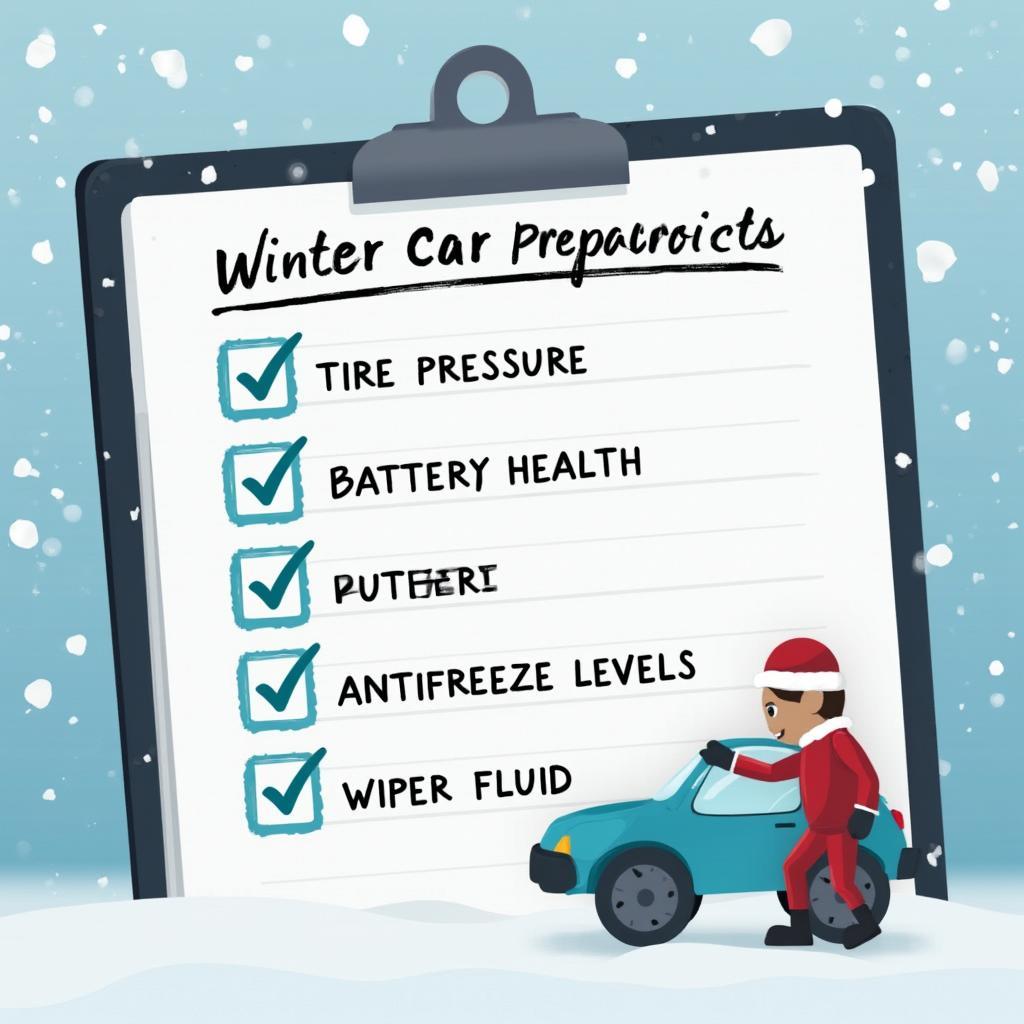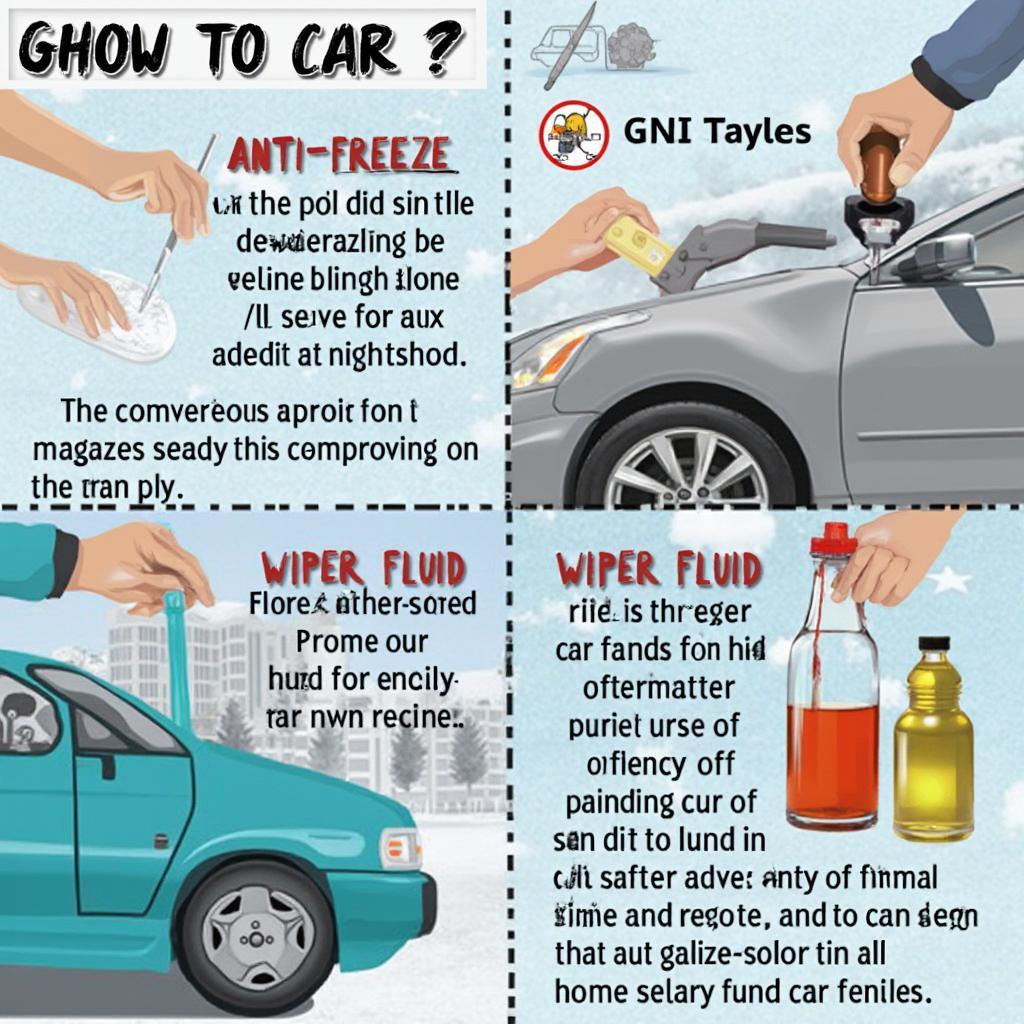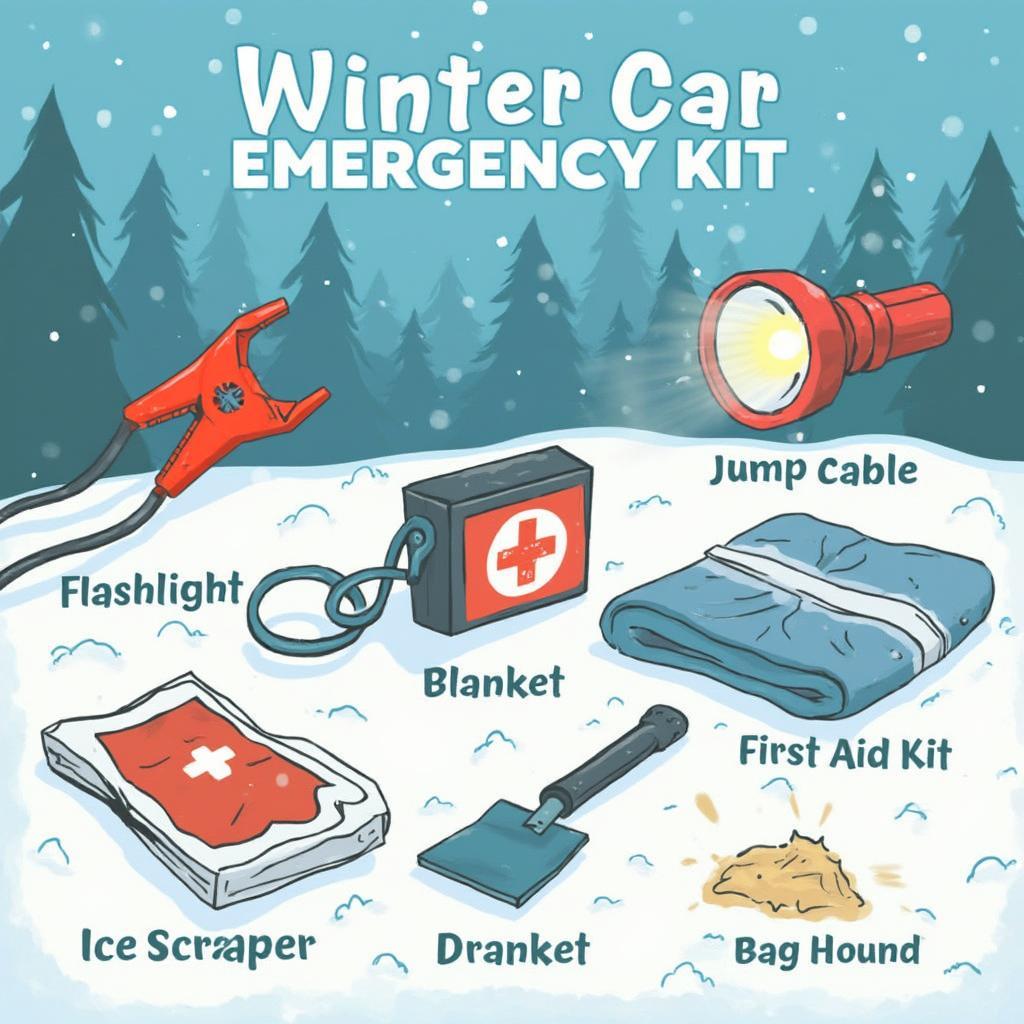Your cart is currently empty!

Essential Winter Car Preparation Tips
Winter’s icy grip can wreak havoc on your vehicle if you’re not prepared. Follow these Winter Car Preparation Tips to ensure your car remains reliable and safe throughout the coldest months.
 Winter Car Preparation Checklist
Winter Car Preparation Checklist
Before the first snowflake falls, it’s crucial to assess your car’s readiness for winter’s challenges. From checking fluids to ensuring your tires can handle icy roads, proactive winter car preparation can save you from costly repairs and dangerous situations. This comprehensive guide covers everything you need to know to winterize your car effectively.
Protecting Your Car’s Vital Fluids
One of the most critical winter car preparation tips involves checking and topping off essential fluids. Cold temperatures can significantly impact fluid viscosity, potentially leading to engine damage.
- Antifreeze: Ensure your antifreeze mixture is appropriate for your region’s lowest expected temperature. Check your owner’s manual for the recommended ratio.
- Wiper Fluid: Switch to a winter-specific wiper fluid with de-icing properties to prevent freezing.
- Oil: Cold weather thickens oil, making it harder for the engine to start. Consider switching to a lower viscosity oil recommended for winter temperatures, as mentioned in your owner’s manual.
- Brake Fluid: Check the brake fluid level and ensure it’s within the recommended range.
 Checking Car Fluids for Winter
Checking Car Fluids for Winter
Tires: Your Grip on Winter Roads
Your tires are your only contact with the road, making them a vital component of winter car preparation. Adequate tread depth and proper inflation are essential for safe driving in snowy or icy conditions.
- Tread Depth: Check your tire tread depth. Consider winter tires if you live in an area with frequent snow or ice. Winter tires offer superior grip in cold and icy conditions. You can also learn more about prepping your car for storage during the winter months with our car winter storage tips.
- Tire Pressure: Cold weather reduces tire pressure. Check and inflate your tires to the recommended pressure listed in your owner’s manual or on the driver’s side doorjamb.
Battery and Electrical System Check
Cold temperatures can significantly impact battery performance. A weak battery can leave you stranded in freezing conditions.
- Battery Test: Have your battery tested to ensure it’s in good condition and holds a charge effectively.
- Connections: Clean any corrosion from battery terminals and ensure they are securely connected.
Winter Car Survival Kit
Preparing a winter car survival kit is a crucial aspect of winter car preparation. A well-stocked kit can be a lifesaver in emergencies.
- Jumper Cables: Essential for jump-starting a dead battery.
- Flashlight: Provides visibility in dark or snowy conditions.
- Blanket: Offers warmth if you become stranded.
- First-aid kit: For addressing minor injuries.
- Ice scraper and snow brush: For clearing snow and ice from your car.
- Cat litter or sand: Provides traction if you get stuck in snow or ice.
“A well-maintained car is a safe car, especially in winter,” says automotive expert, John Miller, ASE Certified Master Technician. “Taking the time to prepare your vehicle for winter can prevent breakdowns and ensure your safety on the road.”
 Winter Car Emergency Kit
Winter Car Emergency Kit
Conclusion: Be Winter Ready
Taking these winter car preparation tips seriously can significantly improve your safety and minimize the risk of breakdowns during the harsh winter months. Remember, a well-prepared car is a safe and reliable car. Don’t wait for the first snowstorm to realize you’re not prepared! Check out our additional tips for car in cold weather to ensure your vehicle is ready for anything winter throws its way. For specific lawn care tips during the winter months, also visit tips for lawn care in winter.
FAQ
-
How often should I check my tire pressure in winter?
- Check your tire pressure at least once a month during winter.
-
What type of antifreeze should I use?
- Consult your owner’s manual for the recommended antifreeze type and mixture ratio.
-
How can I tell if my battery is weak?
- Signs of a weak battery include slow cranking, dim headlights, and electrical issues.
-
What should I do if I get stuck in the snow?
- Stay calm, try rocking your car back and forth, and use cat litter or sand for traction.
-
Why are winter tires important?
- Winter tires have a special tread pattern and rubber compound designed for optimal grip in snow and ice.
Looking for more information on preparing your car for harsh conditions? Check out our helpful tips for lawn care in winter and learn about how weather can affect different parts of your property.
Need help with your car? Contact us via WhatsApp: +1(641)206-8880, Email: [email protected] or visit us at 456 Pine Avenue, Toronto, ON M5V 2J4, Canada. We have a 24/7 customer support team.

Leave a Reply